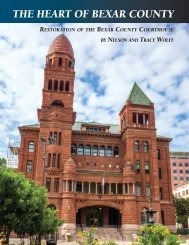Notable New Orleanians: A Tricentennial Tribute
An illustrated history of New Orleans paired with the histories of companies that have helped shape the city.
An illustrated history of New Orleans paired with the histories of companies that have helped shape the city.
Create successful ePaper yourself
Turn your PDF publications into a flip-book with our unique Google optimized e-Paper software.
Eliza Jane Nicholson.<br />
FROM MOUNT, MAY W., SOME NOTABLES OF NEW<br />
ORLEANS, MAY W. MOUNT: NEW ORLEANS: 1896.<br />
she attended a nearby school and soon claimed the title of wildest in the class. Yet it was in<br />
Mississippi that she first began to write, choosing the poetry of nature as her subject and the pen<br />
name “Pearl Rivers.” After the Civil War, Eliza began to submit poems to various journals, including<br />
The Daily Picayune newspaper. In the 1930s Grace King recalled Eliza Jane as “our poet laureate,”<br />
who encouraged young writers.<br />
Showing up in <strong>New</strong> Orleans after the Civil War determined to make a name for herself with her<br />
poetry, Eliza Jane Poitevent caught the eye of The Daily Picayune’s elderly (and married) proprietor,<br />
Colonel A. M. Holbrook. The lack of a literary editor prompted him to offer the post to this<br />
unknown author from Mississippi. At age nineteen Eliza Jane seized the position and evidently<br />
took steps to acquire the proprietor, steps that brought success in 1872 while enraging the absent<br />
wife, who returned to <strong>New</strong> Orleans, went to the office and fired two shots at Eliza, followed by a<br />
bottle over the head. None of her blows was successful, Eliza escaping as the incipient proprietor<br />
of the newspaper. She was 23; Holbrook was 64. The marriage, no more successful than The<br />
Picayune, lasted three years, ending with the Colonel’s death. Eliza Jane Poitevent Holbrook, 26<br />
years old, found herself with a newspaper.<br />
Not long thereafter, Eliza found companionship in the paper’s business manager, George<br />
Nicholson. They married in 1878 and carried the newspaper to success, with the lion’s share of the<br />
credit to Eliza. In 1896, they died of influenza within a week of each another.<br />
<br />
F ELIX<br />
D REYFOUS<br />
(1851-1946)<br />
Notary, businessman, legislator, civic leader, and reformer, Felix Dreyfous was <strong>New</strong> Orleans’<br />
first “Progressive.” The “reform era” between 1888 and 1900 led up to that optimistic period in<br />
American history known as Progressivism, an era that commenced about 1900 and ended with<br />
World War I. During that era Felix Dreyfous and his fellow reformers achieved many of their goals -<br />
—suppression of the Louisiana Lottery, flood control, police reform, sewerage and water service,<br />
dock reform, election reform, and the bold establishment of the still-functioning <strong>New</strong> Orleans City<br />
Park Improvement Association. Felix Dreyfous played a major role in each of these issues.<br />
Born in <strong>New</strong> Orleans to Alsatian Jewish attorney and notary Abel Dreyfous and his Bavarianborn<br />
wife Caroline Kaufman, Felix grew up in the Esplanade Avenue neighborhood near Bayou St.<br />
John. He entered the legal office of his father and received his first notarial commission in 1892.<br />
He would go on to complete more than 300 volumes of notarial acts in his long career.<br />
Elected to the Louisiana legislature in 1888, Felix Dreyfous wrote the <strong>New</strong> Orleans Police Board<br />
bill, his first major piece of legislation. 1 Long a football of politics, the <strong>New</strong> Orleans police department<br />
had declined in quality for decades. The Dreyfous legislation transformed the police department<br />
from one of patronage to one of civil service principles. An unpaid board supervised the new<br />
department and its newly created pension fund. At that time, the Louisiana Lottery was the last<br />
political remnant of Reconstruction, indeed of Post-Reconstruction. Originally chartered in 1868,<br />
it was set to expire in 1895. Dreyfous led the move to deny its re-chartering, marking a major<br />
Progressive victory.<br />
Repeated flooding of the “back-of-town” lands had long diminished property values and threatened<br />
the city’s health. In 1890, Dreyfous persuaded the Legislature to create the Orleans Parish<br />
Levee Board through Act 93, which formed the Parish of Orleans into a public levee district. The<br />
legislature empowered the new board to levy a one-mill tax that would be due in 1890, the very<br />
year of the passage of the act. The new board also had the power to expropriate land necessary for<br />
levees, either in <strong>New</strong> Orleans or in the surrounding parishes. Felix Dreyfous took his oath to serve<br />
as Commissioner from the Second District on August 4, 1890, 2 commissioners electing him the<br />
NOTABLE NEW ORLEANIANS: A <strong>Tricentennial</strong> <strong>Tribute</strong><br />
86
















